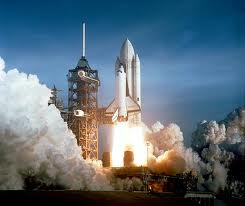We are working on a collaborative project with the NASA Johnson Space Center. Project E148 is to use our TMD technique aboard the NASA Space Shuttles to investigate changes in crew-members’ intracranial pressure and any relationships with Space Adaptation Syndrome (SAS) as the astronauts adapt to zero gravity conditions and on return to Earth.
 Aims of this project are to better understand the pathophysiology of Space Adaptation Syndrome so that treatment and performance of astronauts could be improved.
Aims of this project are to better understand the pathophysiology of Space Adaptation Syndrome so that treatment and performance of astronauts could be improved.
Non-invasive TMD intracranial pressure measurements are being combined with assessments of middle ear function, ECG and continuous blood pressure. The interdependencies are to be investigated and considered in terms of cerebral fluid dynamics.
Considerable Earth benefit may also be derived in terms of understanding the relationship between increased ICP and imbalance, headache, motion sickness, and cognitive performance.
Furthermore, the equipment that has been designed for NASA allows for the first time continuous intracranial pressure measurements to be undertaken by the TMD method.

